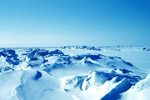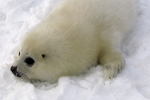Oil has begun to be pumped from the Arctic seabed, according to Russian oil giant, Gazprom. The company announced on Friday that it has begun exploiting oil reserves at the offshore field of Prirazlomnoye. The project, which is several years behind schedule, is hugely controversial and made international headlines in September after Russian military arrested 28 Greenpeace activists protesting the operation along with a British journalist and Russian videographer.
“This is the first project in Russia’s history aimed at developing the resources of the Arctic shelf and the start of large-scale work by Gazprom that will create a major hydrocarbons production centre in the region,” Gazprom, a Russian national company, said in a statement.
Initially charged with “piracy” and then “hooliganism,” the Greenpeace activists and journalists were held in jail for two months, before being granted amnesty this week by Russian President, Vladimir Putin.
 Red dot marks approximate location of Gazprom’s Prirazlomnoye platform in the Russian Arctic. Large islands above it are Severny Island and Yuzhny Island. Photo courtesy of NASA. |
Greenpeace, along with many other environmental groups, have condemned oil companies and governments for pursuing fossil fuels production in the Arctic, contending that no company in the world has the capacity to deal with an oil spill in such harsh and extreme conditions. Gazprom plans to drill for oil year-round, despite Arctic sea ice for much of the year and temperatures hitting -50 degrees Celsius (-58 degrees Fahrenheit).
One of activists arrested, Faiza Oulahsen, called the news a “dark day for the Arctic,” adding that, “Gazprom is the first company on Earth to pump oil from beneath icy Arctic waters and yet its safety record on land is appalling. It is impossible to trust them to drill safely in one of the most fragile and beautiful regions on Earth. This is why I have spent the last two months of my life in jail, but I am just one of millions who oppose this reckless oil rush.”
However, Gazprom has said it has taken all the necessary precautions to deal with a spill.
Last year, Shell abandoned exploratory drilling in the Arctic after a series of mishaps, though it has recently stated it intends to try again. Shell has dropped $4 billion on attempts to exploit Arctic oil deposits.
The Arctic is changing dramatically due to global climate change. Seasonal sea ice is shrinking and thinning as temperatures in the region rise faster in the region than anywhere else in the world. Scientists say that these changes imperil not only iconic wildlife in the region, but locals and indigenous people. Recent research has also tentatively linked the vanishing sea ice to extreme weather patterns worldwide.
Earlier this year, scientists with the Intergovernmental Panel on Climate Change (IPCC) outlined a global carbon budget, which found that if the world is to avoid catastrophic climate change and meet the goals agreed on by governments, most of the world’s remaining fossil fuel deposits must be left untouched.
Related articles
Russia charges imprisoned Greenpeace protestors with hooliganism, instead of piracy
(10/24/2013) Russian investigators announced on Wednesday they are dropping piracy charges against 28 environmental activists and two freelance journalists who have spent a month in custody since they were seized aboard Greenpeace’s boat, the Arctic Sunrise.
Russia charges non-violent activists with ‘piracy’ for protesting Arctic oil drilling
(10/07/2013) In what is being described by Greenpeace as an ‘imaginary offense,’ Russia has charged 30 people with piracy after activists protested against oil exploitation in the Arctic. The 30 charged included not only protestors, but a British journalist and Russian videographer who were on board Greenpeace’s ship, the Arctic Sunrise, when it was stormed by the Russian military late last month.
‘Heading towards an ice-free Arctic’: sea ice extent hits sixth lowest on record

(09/18/2013) Sea ice cover in the Arctic shrank to one of its smallest extents on record this week, bringing forward the days of an entirely ice-free Arctic during the summer. The annual sea ice minimum of 5,099m sq km reached on 13 September was not as extreme as last year, when the collapse of sea ice cover broke all previous records.
Climate change killing harp seal pups

(08/20/2013) As sea ice levels continue to decline in the northern hemisphere, scientists are observing an unsettling trend in harp seal young mortalities regardless of juvenile fitness. While a recent study found that in harp seal breeding regions ice cover decreased by up to 6% a decade from 1979 on, a follow-up study in PLoS ONE compared the rate of harp seal strandings to total ice cover from 1992 to 2010.
(07/30/2013) Rapid thawing of the Arctic could trigger a catastrophic “economic timebomb” which would cost trillions of dollars and undermine the global financial system, say a group of economists and polar scientists. Governments and industry have expected the widespread warming of the Arctic region in the past 20 years to be an economic boon, allowing the exploitation of new gas and oilfields and enabling shipping to travel faster between Europe and Asia.
Featured video: How climate change is messing with the jetstream
(05/08/2013) Weather patterns around the globe are getting weirder and weirder: heat waves and record snow storms in Spring, blasts of Arctic air followed by sudden summer, record deluges and then drought.







